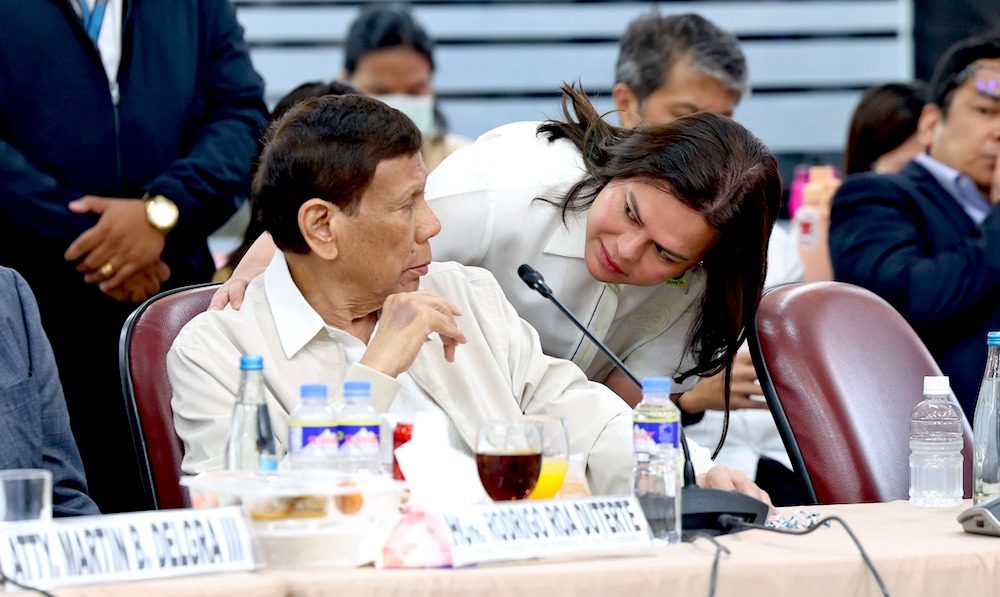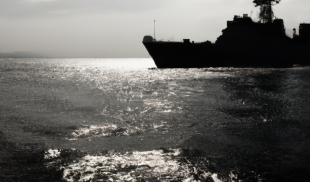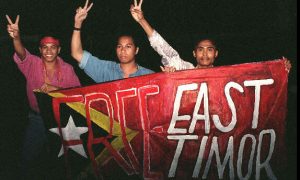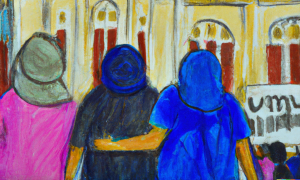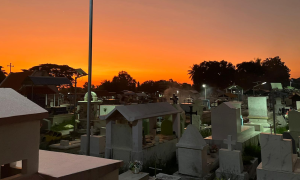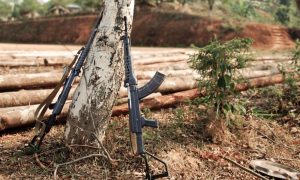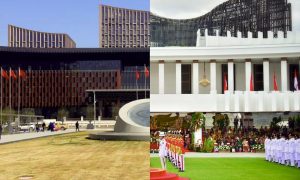The past month has seen the furious return of Rodrigo Duterte, who was summoned by the Philippine Congress to answer for the brutal excesses of his “drug war.” Across two subcommittee hearings, the first by the Senate and then by the House of Representatives, lawmakers pressed Duterte on the estimated 30,000 summary executions he encouraged, oversaw, and allegedly financed as president.
The subcommittees, formed in August 2024, respond to the insistence of now-President Ferdinand “Bongbong” Marcos Jr. that domestic institutions are capable of investigating and prosecuting government misconduct. The judiciary and police, Marcos stressed, are “robust, healthy, and active.” But the Philippines has been under the darkening cloud of the International Criminal Court (ICC), the supranational tribunal charged with trying the most grievous crimes. Last year, the ICC greenlit a probe into possible crimes against humanity committed as part of the drug war, despite Duterte’s withdrawing the Philippines from the Court in 2018. Since his 2022 election, Marcos has cast the ICC as a threat to national sovereignty, refusing to recognise its jurisdiction, let alone aid its investigation.
At first glance, Marcos’ faith in domestic institutions seems well-placed. The mere existence of the recent congressional hearings suggests an able and earnest government, one that demands full answers and makes no exception for rank or status. Before Duterte was called to appear, the hearings had already collected hours of testimony from local officials, senior police officers, and victims’ families, all directing blame at the former president. Following Duterte’s appearance, House Committee Chairperson Ace Barbers claimed he now had sufficient evidence to author a report on whether state officials ordered and rewarded killings. Soon after, the Department of Justice announced it would file criminal charges against Duterte, should its review of the new evidence and testimonies warrant them.
But it would be misplaced to believe that justice in the Philippines is so clear-cut and promising— indeed, it would be the exception, not the rule, if this were so. Because of both lack of political muscle and legal shortcomings, Philippine institutions are not up to the task of investigating and prosecuting crimes against humanity. As a result, the former president may well walk free—even as a hero—a while longer.
Duterte’s political shadow
Two years on since stepping down as president, Duterte still wields considerable political clout. As a leader who commanded sweeping control of Congress and whose term maintained unusually high public favour, he has cast one of the longest political shadows of any Philippine ex-president.
Duterte’s influence is perhaps felt no clearer than in the country’s current executives. His daughter, Sara, is the vice president, whose 2022 run with Marcos carried the coveted Bisaya vote and ultimately won three-fifths of the electorate. In the Philippines, the president and vice president are elected on separate tickets, but the Marcos–Duterte camps ran as a de facto alliance under the “Uniteam” campaign brand. But their partnership turned increasingly sour, as Sara’s power within it diminished in the two years since their inauguration.
Taking after her father, she has bristled repeatedly against Marcos, fashioning herself as a victim of conspiracy and even as the “real” opposition. The president, at his political expense, has mostly remained above the fray, finding it either beneath his dignity, or beyond his abilities, to use the bully pulpit in retaliation. In this way, the Dutertes have both insisted and been allowed to remain the loudest voice in Philippine politics, despite no longer presiding at its helm. And should popular sentiment towards them stay warm, they are forecasted to return to the presidency in 2028.
The recent drug war hearings show that the ex-president still haunts Congress, too. In the Senate, Duterte’s allies fought successfully for him to deliver the first remarks, despite victims’ families already slated to do so. “If you look at the former president, he’s already so sleepy,” insisted Senator Bato Dela Rosa, who was the architect of the drug war as Philippine National Police (PNP) Chief under Duterte. “With all due respect, we know he’s old. For humanitarian consideration,” he said.
The hearing soon lost more gravitas. Dela Rosa badgered a priest, who spoke of his efforts to aid victims’ families, as Duterte allies recalled the president’s achievements. Duterte himself swore and interrupted to no consequence, even inviting a senator to join him in hell. Laughter and cheers, equally unpunished, erupted from his lackeys in the gallery. The House, by contrast, was not as compliant to Duterte. Yet the ex-president still openly rebelled, gesturing to punch one former lawmaker and nearly hurling his microphone at another. Refusing to scold Duterte, the committee called for numerous one-minute suspensions to allow him to cool off.
Even if these hearings unveil new truths about the drug war, their lack of seriousness has made it clear that they fall short as meaningful levers of accountability. Instead, they return to the ex-president control of the national stage, from which he defends mass murder and humiliates those opposed. Likely, Duterte’s performance of grievance hardens his image as a fighter, ever facing down conniving trapos (traditional politicians) who seek now to upset his legacy. It is no wonder Congress has little appetite to discipline him: most are either still bound by him or still fear him. With midterm elections in May 2025 set to swell the number of Duterte allies in Congress, it is possible future hearings will even more effectively close ranks around him.
These political headwinds seem to have made for an indecisive President Marcos. It would explain why he has not ordered an end to the drug war, despite express commitments to rehabilitating drug users. According to Dahas, a project of the Third World Studies Center at the University of the Philippines, there have been 848 reports of drug-related killings under Marcos as of 23 November 2024. Nor has Marcos cracked down on the PNP’s illegal refusal to release drug war data to the Commission on Human Rights, a constitutional body that has been kept in the dark on the issue for eight years. And perhaps most grave of all, the president has not offered any protections to witnesses and victims’ families, who are hesitant to assist and pursue cases in local courts after repeated harassment from police.
In lieu of substantive policy, Marcos has obsessed over political window dressing. In May 2024 he convened in May a human rights protection “super body” and in early November launched a drug war task force, which he boasted should ward off the ICC. Philippine civil society has dismissed such efforts as “toothless” and insincere.
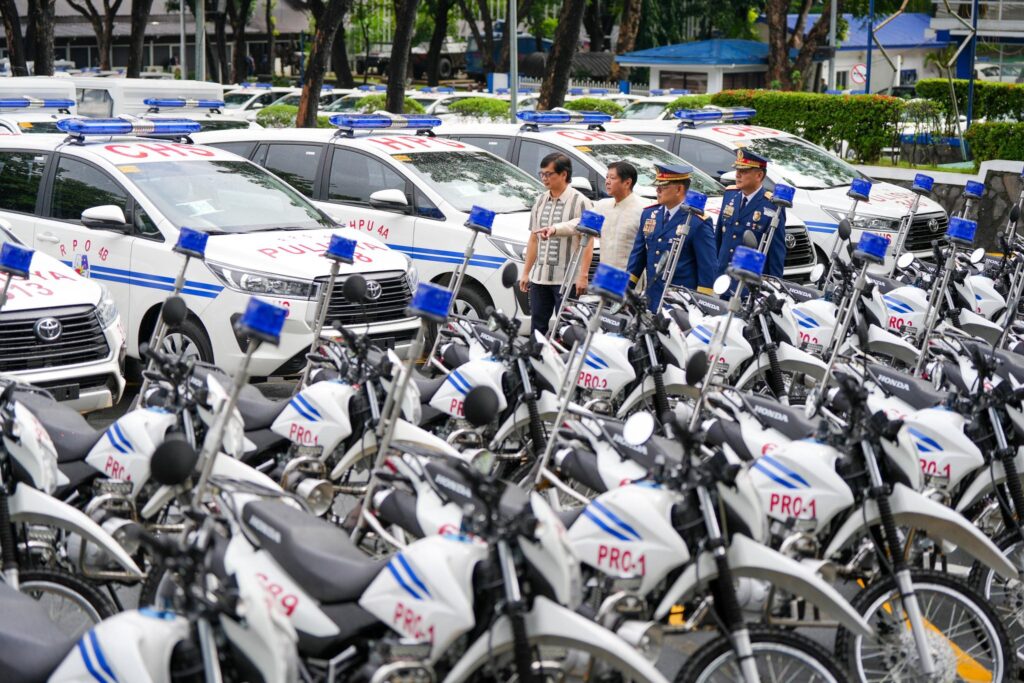
President Ferdinand ‘Bongbong’ Marcos Jr visits the Philippine National Police headquarters at Camp Crame, Quezon City, August 2024 (Photo: Bongbong Marcos on Facebook)
Insufficient legal standards
Marcos’ feeble efforts means the ICC has resumed its monitoring of the Philippines. Should the government still fail to make meaningful headway—proving “unwilling or unable to genuinely carry out the investigation and prosecute the perpetrators”—the Court will exercise jurisdiction and steer the proceedings instead. This is what the ICC calls “complementarity”, under which the Court only pursues cases to the extent that they intend to complement, rather than duplicate or supersede, domestic legal processes.
While Philippine authorities have been investigating and prosecuting drug war killings, they ultimately fail to meet the “same person, same conduct” threshold the ICC’s complementarity principle applies. Genuinely carrying out investigations and prosecutions means that proceedings reach the exceptional gravity of international crime, prosecuting the most responsible. This means that the drug war’s chief implementers, not just low-level police officers, should be brought before Philippine courts.
Additionally, complementarity’s test is met when the same person identified in the ICC warrant of arrest is prosecuted domestically for the same conduct or pattern of acts laid out in the indictment. So far, the cases touted by the Philippine government as examples of robust local proceedings have not captured the core evil of what the ICC terms “crime against humanity of murder”—systematic or widespread state attacks directed against civilians. Local prosecutions for murder, with some even downgraded to homicide, or administrative proceedings that strip police officers of status and benefits barely scratch the surface of what constitutes crimes against humanity.
Ayungin Shoal and the spectre of informal international law
What an alleged gentleman’s agreement tells us about China’s vision of international law
With memories fraying, witness intimidation ongoing, and evidence being lost to time and human incompetence, Philippine institutions cannot for now match the ICC’s rigor and expertise. For instance, the ICC prosecutor’s office conducted a preliminary examination before the Court even authorised an investigation in 2021. The ICC is also systematically combing through evidence and testimonies from victims’ families. And what of Philippine investigations? They have proven only piecemeal and lax.
So what’s in it for the Philippines if it cooperates with the ICC? By design, there is room for participation by domestic authorities across the Court’s proceedings. Perhaps then the government’s focus should be its competent engagement at The Hague, rather than dying on the hill of sovereign jurisdiction.
Turning to the ICC
As the Marcos–Duterte infighting intensifies by the week, it is tempting to imagine that the sitting president will succumb to political incentives to finally welcome the ICC, initiating genuine accountability and sounding the death knell for the Dutertes. But those odds are unlikely. Opening up the Philippines to ICC scrutiny would invite a flurry of investigations into additional state breaches of international law. Acts of torture, arbitrary arrests, red-tagging, enforced disappearances, and war crimes: these have all quietly persisted under the current government. Philippine ignominy in the eyes of the world would no doubt embarrass Marcos.
Yet families of drug war victims do not bear such politics in mind: their focus has been on rescuing the dignity of their slain loved ones—and they see the opportunity now being squandered.
As Duterte lambasted House lawmakers in the hearing, Mary Ann Domingo—whose husband and son were dragged from their home and gunned down by police—couldn’t help but feel the improbability of justice. Domingo was one of three widows who testified just feet from Duterte, and her case is likely the last to receive a local court conviction.
“Is there really justice?” she lamented to Rappler. “I was supposed to be happy because I faced [Duterte], I was supposed to be happy because he can finally own up to what he did, but at the end of it, we still felt defeated.”
Like Domingo, victims’ families pin their hopes on the ICC to finally give them justice—to arrest the drug war’s proponents or, at the very least, to recognise the breadth of human loss. That faith is well-placed: in The Hague, victims are granted a full account of their status and views throughout adjudication, from the confirmation of charges to trial and sentencing. In the Philippines, victims’ voices and stories are quickly drowned out—by unhelpful prosecutors, bullying police, and technical rules that shield perpetrators from bad publicity. In The Hague, proceedings might also kindle national healing, encouraging Filipinos who cheered for the murder of their fellow citizens some reflection of their brutality. In the Philippines, such reckoning is being actively foreclosed by the complicit powers that remain.
 Facebook
Facebook  Twitter
Twitter  Soundcloud
Soundcloud  Youtube
Youtube  Rss
Rss 